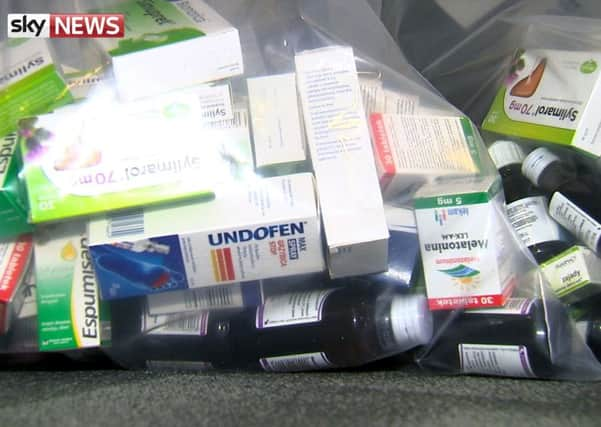Illegal Edinburgh ‘pharmacy’ raided in drug busts


PRESCRIPTION drugs worth tens of thousands of pounds have been recovered from an Edinburgh flat as part of an international crackdown on counterfeit and unlicensed medicines.
Officials from the Medicines and Healthcare Products Regulatory Agency (MHRA) carried out an early-morning raid at the property in Leith, seizing around £70,000 worth of drugs not licensed for use in the UK.
Advertisement
Hide AdAdvertisement
Hide AdThe action was part of Operation Pangea, an international effort co-ordinated by Interpol which was designed to smash the illegal trade in prescription and over-the-counter medicines.
The operation led to more than £15.7 million worth of counterfeit and unlicensed medicines being seized across the UK, including quantities of illegal slimming pills, cancer drugs and others to treat conditions such as narcolepsy and erectile dysfunction.
The Edinburgh raid was carried out after intelligence suggested Polish medicines, not licensed for use in the UK, were being sold online from a residential address. The MHRA carried out a “test purchase”, buying an illegal smoking-cessation drug online.
Investigators found a Polish couple operating from a two-bedroom flat, where one of the bedrooms had been turned into a “pharmacy”.
Speaking after the raid, Danny Lee-Frost, head of operations for MHRA, said: “It’s a two-bedroom flat. One of the bedrooms is turned over to a pharmacy, shelved out with tons and tons of products, some of which we can immediately recognise as medicines, some of which looks medicinal and others which we’re not sure of.
“The couple have admitted they know some of them are medicines, so we bagged those up first. But we don’t know what the rest are. We don’t know which ones are medicines, which are food supplements, and they don’t know either.
“There’s a hell of a lot in there, far more than we expected. We expected a much smaller operation than that.”
Mr Lee-Frost said it was typical to find unregulated Polish medicines being sold in Polish shops and delis.
Advertisement
Hide AdAdvertisement
Hide AdBut he said this was the first known example of Polish medicines being sold on this scale over the internet in the UK.
He added: “There are none of the checks and safeguards in place to protect the consumer. For instance, what if one of the manufacturers of one of these products did a recall? What if they were really dangerous? The customer is not going to know about it. They have to be the authorised product for the country in which they’re sold, otherwise that whole system just collapses.
“Our advice is to not buy medicines over the internet unless you have a prescription and are going to a properly registered and authorised internet pharmacy.”
The investigation is ongoing, but those responsible for selling the drugs could ultimately face two years in jail under the Medicines Act.
The Leith raid was part of a month-long international crackdown which took place in 115 countries.
In total, more than £50m worth of drugs were seized worldwide. In the UK, MHRA enforcement officers, with assistance from police, raided addresses in connection with the illegal internet supply of potentially harmful medicines.
The UK operation also resulted in 1,380 websites being closed down, 339 of which were domestic sites.
Medicines seized included drugs for epilepsy; breast/prostate cancer; depression, diabetes and anti-virals. Thousands of fake condoms were also seized.
Advertisement
Hide AdAdvertisement
Hide AdMHRA head of enforcement Alastair Jeffrey said the UK operations had recovered nearly twice the amounts of drugs as last year.
He said: “Operation Pangea is the global response to internet facilitated medicines and devices crime. As a result of our intelligence-led enforcement operations we have seized £15.8 million worth of counterfeit and unlicensed medicines and 15,000 devices in the UK alone – which is almost twice as much as we recorded last year, and clear evidence that this is a growing concern that has to be taken seriously.
“Criminals involved in the illegal supply of medical products through the internet aren’t interested in your health - they are interested in your money and are able to get this by selling you a potentially dangerous product, or by stealing your bank details. To protect your health, visit your GP, get a correct diagnosis and buy medicines from a legitimate high street or registered pharmacy which can trade online.”
The majority of the products seized in UK came from India, China, Hong Kong and Singapore.
Alex Lawther, from Border Force’s postal command, added: “Border Force regularly detects and seizes illegal and restricted products imported through the postal system including fake and unlicensed medicines. Our involvement in this operation with the MHRA demonstrates our commitment to combat this form of smuggling.
“Our message to the public is simple – don’t buy anything online unless you are certain it comes from a legitimate source.”